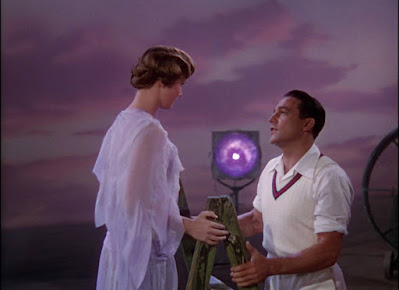Why I Love... The Philadelphia Story (1940)
"Hello, friends and enemies." Oh, The Philadelphia Story. One of the best romantic comedies out there, Old Hollywood or not. With a cast of familiar favorites, filled with one-liners and Oscar-winning acting and Jimmy Stewart singing "Over the Rainbow," it's hard not to love this movie.
After Top Hat, this was the second classic film I watched, and the one that I've rewatched the most. It also has one of the most compelling backstories. Katharine Hepburn, spurred by a late 1930s lull in her popularity (which included a feature on 1938's list of "Box Office Poison" actors), had made her way to New York City to return to her Broadway roots. In 1939, she was starring in Philip Barry's play The Philadelphia Story, which he had written specifically for her. The show was a smash hit, and completely reversed the Great Kate's negative publicity - the only remaining question was, would Hollywood welcome her back?Hepburn was determined to find film success again and became the mastermind behind her own comeback. Howard Hughes, the pilot/businessman/womanizer, bought her the film rights as a gift which she gladly accepted. Back in Hollywood, she waited around for the highest bidder until Louis B. Mayer of MGM bought them for a mere $250,000 - with Hepburn allowed to choose her co-stars as well as the producer, director, and screenwriter. In short, Katharine Hepburn built The Philadephia Story movie from the ground up.
Though Hepburn wanted Clark Gable and Spencer Tracy, schedule conflicts gave her Cary Grant (who insisted on top billing) and Jimmy Stewart. The director was George Cukor, the legend whose work with Kate already included A Bill of Divorcement and Little Women. Cary and Kate were longtime friends and co-stars in Sylvia Scarlett, Holiday, and Bringing Up Baby. This would (sadly) be their last collaboration.
Tracy Lord is one of my favorite film characters for many reasons. She's unapologetically human, and it's her determination to be truly seen by others that drives her storyline ("I don't want to be worshipped, I want to be loved!"). The men in her life, including her own father, see her as a goddess - pure and gorgeous and incapable of mistakes. Tracy spends the movie trying to prove them wrong. She runs off into town, gets drunk on champagne, takes a midnight swim in the pool, and essentially goes against everything a refined society woman like herself is expected to do the night before her wedding.
Between the reporter, the ex-husband, and the fiancé vying for Tracy's affection, only one of them will be able to see all sides of her - the beautiful and the messy, the goddess and the human. With characteristic wit and charm, Katharine Hepburn brings Tracy Lord to life in a way that makes her infinitely relatable, even eighty years after the movie's release in 1940. Though she didn't win the Best Actress Oscar she was nominated for (that went to Kitty Foyle's Ginger Rogers), Hepburn's influence on the heart and soul of The Philadelphia Story are eternal - and the result is a movie worth loving.










Comments
Post a Comment